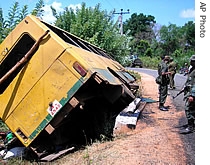2006年VOA标准英语-Landmine Monitor Reports Dramatic Progress
时间:2019-01-09 作者:英语课 分类:2006年VOA标准英语(九月)
By Ron Corben
Bangkok
13 September 2006
The International Campaign to Ban Landmines 2 reports dramatic progress in de-mining around the world. But landmines still inflict 3 a terrible toll 4 in 58 countries worldwide, says the campaign group in its annual survey that was released in Geneva on Wednesday. Both state and non-state armed groups in Southeast and South Asia still use mines.
-----

Soldiers patrol near a bus overturned by a landmine blast in Kabithigollewa, about 210 kilometers northeast of Colombo, Sri Lanka (file photo)
The International Campaign to Ban Landmines report for 2006, released Wednesday, says that mine casualties occurred in 58 countries last year.
Casualties from mines and explosive remnants rose 11 percent to more than 7,328, a number the report admits is probably less than half the real total. The highest number of casualties, more than 1,100, was recorded in Colombia.
Thai Deputy Prime Minister Chidchai Wannasathit said at the report's launch in Bangkok that despite efforts to stop landmine use and production, mines keep killing 5.
"Landmines are an especially evil form of warfare," he said. "They kill indiscriminately, regardless of age, gender 6, nationality. Landmines can continue to kill long after the conflict ends."
The military powers of China, India, Pakistan, Russia and the United States are among those states that have not yet signed up to the 1997 Mine Ban Treaty.
Landmine clearance 7 progressed in 2005, however, says Stuart Maslen, chief editor of the mine monitoring report.
"A total of more than 740 square kilometers were returned for use by mine action programs around the world," he added. "That is the biggest single annual de-mining total ever recorded."
More than 470,000 landmines were removed, thanks to better identification of areas suspected of carrying mines. De-mining has continued in Afghanistan, for example, despite increased security risks, the death of eight de-miners, and funding shortfalls.
Mr. Maslen says the use of antipersonnel mines remains 8 a key concern. Three governments use antipersonnel mines - the Russian Federation 9, Burma, and Nepal - as do insurgent 10 groups in India, Nepal, Pakistan and Sri Lanka.
"We condemn 11 all use of antipersonnel mines, whether by governments or armed opposition 12 groups, but it is particularly disappointing that governments despite the existence of the treaty, despite the political imperatives 13 continue to use these weapons," he said.
In Burma, both the ruling military and ethnic 14 armies fighting the government use antipersonnel mines extensively, the report said. Thai senator, Kraisak Choonhavan, agrees that Burma is a critical case in Southeast Asia.
"Burma is probably the most dangerous country, the most contaminated country in this region, equal to the places like Afghanistan," he said. "Along the Thai Burma border the mining of antipersonnel mines has not decreased at all. It has increased."
Meanwhile, Thailand's mine clearance has slowed and is expected to fail to clear all mines by the target of 2009.
Total funding for anti-mining work fell six percent in 2005. The United States is the largest contributor to global mine action providing almost $82 million to the $376 million funding program. Other major contributors include the European Commission, Japan, Norway and the United Kingdom.
Mr. Maslen says mine-affected states should commit more funds to the fight.
"Ultimately it is the responsibility of the country on whose territory contamination needs to deal with the problem," he added. "And we call upon all the states to do more using their own resources."
Landmine campaigners say continued funding is necessary to free all countries of mines by the end of 2010.
- A landmine is a kind of weapon used in war.地雷是一种运用于战争的武器。
- The treaty bans the use,production and trade of landmine.那条约禁止使用生产和交易雷。
- The treaty bans the use production and trade of landmines. 该条约规定,禁止使用地雷相关产品及贸易。
- One of the weapon's of special concern was landmines. 在引起人们特别关注的武器中就有地雷。
- Don't inflict your ideas on me.不要把你的想法强加于我。
- Don't inflict damage on any person.不要伤害任何人。
- The hailstone took a heavy toll of the crops in our village last night.昨晚那场冰雹损坏了我们村的庄稼。
- The war took a heavy toll of human life.这次战争夺去了许多人的生命。
- Investors are set to make a killing from the sell-off.投资者准备清仓以便大赚一笔。
- Last week my brother made a killing on Wall Street.上个周我兄弟在华尔街赚了一大笔。
- French differs from English in having gender for all nouns.法语不同于英语,所有的名词都有性。
- Women are sometimes denied opportunities solely because of their gender.妇女有时仅仅因为性别而无法获得种种机会。
- There was a clearance of only ten centimetres between the two walls.两堵墙之间只有十厘米的空隙。
- The ship sailed as soon as it got clearance. 那艘船一办好离港手续立刻启航了。
- He ate the remains of food hungrily.他狼吞虎咽地吃剩余的食物。
- The remains of the meal were fed to the dog.残羹剩饭喂狗了。
- It is a federation of 10 regional unions.它是由十个地方工会结合成的联合会。
- Mr.Putin was inaugurated as the President of the Russian Federation.普京正式就任俄罗斯联邦总统。
- Faruk says they are threatened both by insurgent and government forces.法鲁克说,他们受到暴乱分子和政府军队的双重威胁。
- The insurgent mob assembled at the gate of the city park.叛变的暴徒聚在市立公园的门口。
- Some praise him,whereas others condemn him.有些人赞扬他,而有些人谴责他。
- We mustn't condemn him on mere suppositions.我们不可全凭臆测来指责他。
- The party leader is facing opposition in his own backyard.该党领袖在自己的党內遇到了反对。
- The police tried to break down the prisoner's opposition.警察设法制住了那个囚犯的反抗。
- Nixon, however, had other imperatives. 但尼克松另有需要。 来自辞典例句
- There could be some cultural imperatives in there somewhere! 在公共传播那里,在某些方面,可能有更迫切的文化需要! 来自互联网